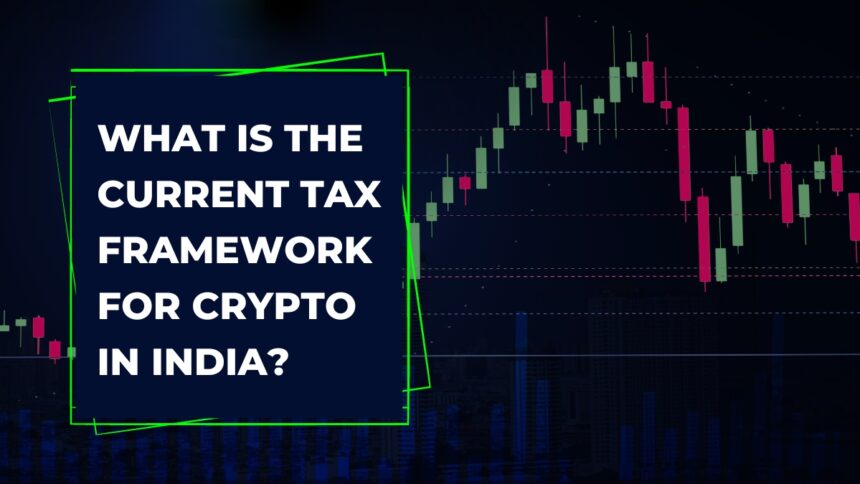What is the current tax framework for crypto in India?
India’s foray into the world of cryptocurrencies has been marked by excitement and uncertainty in equal measure.
While digital assets have opened doors to new investment opportunities and financial innovations, their regulatory landscape remains murky, particularly when it comes to taxation.
As more Indians turn to crypto, understanding the current tax framework becomes crucial. This article delves into the intricacies of crypto taxation in India, unpacking the rules, exploring the challenges, and outlining the implications for investors.
Demystifying the Digital Tax Landscape:

Gone are the days of crypto existing in a regulatory grey area. In 2022, India took a definitive step towards taxing cryptocurrency transactions by introducing the following provisions:
- 1. A flat 30% tax on income from the transfer of “Virtual Digital Assets” (VDAs), a term encompassing cryptocurrencies, non-fungible tokens (NFTs), and other digital assets under the Income Tax Act. This applies to both short-term and long-term capital gains earned from selling or trading VDAs.
- 2. An additional 1% tax deducted at source (TDS) on all VDA sale transactions exceeding Rs. 10,000 will be effective from July 1, 2022. This acts as a pre-emptive tax collection mechanism similar to TDS on salary income.
Navigating the Nuances:
While the basic framework seems straightforward, several nuances within these provisions pose challenges for investors:
Lack of Cost Basis Recognition:
Unlike traditional investments like stocks, where the purchase price forms the basis for calculating capital gains, the current crypto tax regime in India does not recognize the cost of acquisition of VDAs.
This means the entire sale value of VDAs is considered taxable income, potentially leading to a higher tax burden than intended.
The “No Loss Set-off” Dilemma:
Unlike other asset classes, crypto losses cannot be offset against gains from other VDA transactions or even from other sources of income. This significantly disadvantages investors who experience losses in the volatile crypto market.
The Challenge of Valuation:
Determining the fair market value of VDAs for tax purposes remains a complex issue. The lack of standardized pricing mechanisms and the decentralized nature of crypto exchanges make accurate valuation a constant struggle.
Uncertainties around NFTs and DeFi:
The applicability of the current tax framework to NFTs and decentralized finance (DeFi) activities remains unclear, further adding to the regulatory ambiguity.
Implications for Investors:

With these challenges in mind, what does the current tax framework mean for Indian crypto investors?
- Increased Tax Burden: The lack of cost basis recognition and loss set-off provisions can lead to a significantly higher tax liability compared to other investments.
- Need for Record Keeping: Careful and detailed record-keeping of VDA purchases, sales, and transfers is essential for accurate tax reporting and to avoid potential penalties.
- Seeking Professional Guidance: Navigating the complexities of crypto taxation can be overwhelming for individuals. Consulting tax advisors with expertise in the field is highly recommended.
The Future of Crypto Tax:
As the crypto landscape in India continues to evolve, the tax framework is likely to change. Here are some potential developments to watch out for:
- Introduction of Cost Basis Recognition: Recognizing the cost of acquisition of VDAs would reduce the tax burden and provide a more equitable taxation system.
- Differentiated Tax Rates for Different VDAs or Activities: Policymakers may consider introducing graduated tax rates based on the type of VDA or the nature of the transaction (e.g., trading vs. staking).
- Regulatory Clarity for NFTs and DeFi: Clearer regulations and tax guidelines for NFTs and DeFi activities would provide much-needed certainty for investors in these emerging areas.
Conclusion:
While the current tax framework for crypto in India presents challenges, it also represents a positive step towards recognizing and regulating the digital asset industry.
By understanding the intricacies of the current rules and staying informed about potential future developments, investors can navigate the crypto tax landscape effectively and optimize their investment strategies.
As the regulatory environment evolves, one thing is sure: India’s journey into the digital currency realm promises to be both exciting and intricate, demanding a flexible and adaptable approach to taxation in the years to come.
current tax framework for crypto current tax framework for crypto current tax framework for crypto current tax framework for crypto current tax framework for crypto current tax framework for crypto
